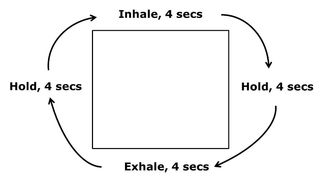Sleep Paralysis Survival Kit
In order to beat, or at least avoid sleep paralysis, understanding what it is and why you have it is key.
Sleep paralysis, looking past the spookiness, is really just a disruption during your deep sleep that's characterized by limited movement and feelings of dread.
First off, do not open your eyes. Whatever you hear, whatever you feel, keep your eyes closed. This suggestion is not meant to scare you, but to warn you that it is very common to see strange things as part of the hallucination effect that accompanies sleep paralysis. Such hallucinations can cause someone to see a variety of terrifying entities from shadow-men to an old hag on your chest. Additionally, auditory hallucinations are also symptoms of the parasomnia.
The following will be a list of different coping mechanisms you can use to get out of, or avoid sleep paralysis:
Positive affirmations
Believe it or not, your mind is the most powerful asset you have in this world. Now, affirmations are simply statements made by the voice in your head, or just statements you tell yourself/ visualize (for those with no internal monologue). The use of positive affirmations is basically positive self programming, or adapting to a better habit. Personalizing this habit will be able to biologically alter the brain's response to behavior.
 |
Change that attitude
Again, our minds are powerful...but fear is our own worst enemy, as it drives us into bouts of anxiety and suspends our potential. During sleep paralysis, change your mindset from fear to fight. You are in control of your body, it belongs to you. Assert that no entity or biological sleep disruption can get the best of you. Changing your attitude from fear to determination will alleviate the stress of the situation and help get you back to full consciousness sooner.
Wiggle the extremities
During SP, your muscles are in a relaxed state as the brain enacts a temporary paralysis so you don't act out your dreams. So, a goal is to get your body moving to fight off that paralytic sensation. To achieve this, concentrate on your fingers and toes; try to form a fist. Doing so will ease you out of the paralysis as you gain more control.
Working on that sleep schedule
It's understandable that people have the misconception of sleep being useless, since it's a period of time in which the individual can't get anything done (even though it's really a time for your body to regulate itself), but it doesn't beat the fact that sleep is necessary for full functionality. Getting at least 6 hours of sleep, and having a consistent "bed time" makes you less likely to have sleep disruptions that can cause SP. Plus, the more sleep you lack, the more sleep debt you accumulate that can come back to bite you later on...and cause more disruptions while sleeping- and very weird dreams.
Breathing exercises
Breathing exercises have been shown to reduce anxiety, improve focus, and reduce muscle tension. Try these exercises before going to sleep, and during sleep paralysis to help calm your nerves, reduce blood pressure, and take away that suffocating feeling.
- 4-7-8 method
Inhale for 4 seconds
Hold your breath for 7 seconds
Exhale for 8 seconds
- Roll Breathing
Inhale and exhale slowly, and lay a fist on your belly, feel your body roll as you breathe. This exercise brings control to your lungs.
- Box Breathing
 |
| W. R. Klemm Box method breathing |
Sleep position
Avoid sleeping on your back. Normally, sleeping on your back with your arms to your sides is where sleep paralysis can get the best of you. Also understand that this position is what some people use to lucid dream, which we'll cover another time.
I understand that all of this is easier said than done. I understand that sleep paralysis is truly one of the scariest occurrences to happen when you're just trying to rest, but you have all the power, so show it.
Comment down below which mechanisms have worked for you!
Comments
A breathing technique I've used over the years to develop lung capacity is to take a deep breath, hold as long as I can, let it out slowly and when I think it's all out, purse my lips and blow out some more and then hold as long as I can. I used to practice doing that when walking. Now that I don't walk and my lungs are somewhat compromised due to my paralysis, I really need to do conscious breathing techniques, but I seldom think about it.